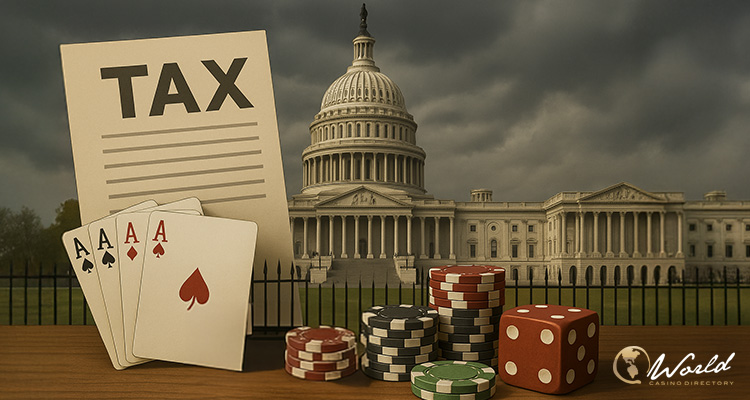Efforts to undo a newly enacted tax provision affecting gambling losses came to a halt in the U.S. Senate on Thursday, as Republican lawmakers blocked a measure led by Nevada Democrat Sen. Catherine Cortez Masto. The provision—part of the expansive tax and spending bill signed by former President Donald Trump last week—has drawn fierce backlash from professional gamblers and Nevada officials, who argue it could severely damage the state’s gaming-driven economy.
Cortez Masto had sought unanimous consent to pass a bill reinstating the full deductibility of gambling losses, which the new law limits to 90% of winnings starting in 2026. However, her attempt was thwarted by Sen. Todd Young (R-Ind.), who objected on procedural grounds despite expressing support for the bill’s intention.
“I strongly support the underlying bill, but will have to object unless you can agree to my request,” Young said according to Associated Press, signaling that he would only lift his objection if Democrats agreed to attach unrelated provisions, including a carve-out for religious institutions in endowment tax policy—a proposal previously excluded by Senate rules.
New Tax Limits Raise Alarms Across Gaming Sector
Under the previous law, gamblers who itemized could fully deduct losses up to the amount of their winnings. That means a player who won and lost $100,000 in the same year owed no taxes. Under the revised rule, that same player would only be able to deduct $90,000, leaving $10,000 subject to taxation—even if no net gain was made.
Professional poker player Phil Galfond voiced concern just before the bill’s passage, writing, “This new amendment to the One Big Beautiful Bill Act would end professional gambling in the U.S. and hurt casual gamblers, too.”
The deduction change was embedded deep in the 900-page “One Big Beautiful Bill Act,” unveiled by Senate Finance Committee Chair Mike Crapo. Some senators, including key Democrats, admitted they were unaware of the provision until shortly before the vote. “My understanding is many Republicans, many Democrats did not even know it was part of that process,” Cortez Masto said.
Nevada Leaders Warn of Economic Fallout
For Cortez Masto and other Nevada lawmakers, the issue goes beyond tax code adjustments—it threatens the foundation of their state’s economic engine. On the Senate floor, she warned that the change “will do irreparable harm to our nation’s gaming industry if it takes effect—especially in Nevada.”
She cautioned that major tournaments like the World Series of Poker could be relocated to other countries or pushed into illegal markets, potentially discouraging tourism and deterring high-stakes gamblers from participating altogether. “It could punish tourists who come to Vegas to win big,” she said.
The senator’s concerns were echoed in the House, where Rep. Dina Titus (D-Nev.) introduced companion legislation named the Fair Bet Act, co-sponsored by Republican Rep. Mark Amodei. Titus placed the blame squarely on the Senate: “The Senate got us into this mess. Now it’s time for both chambers to unite behind my bipartisan Fair Bet Act to ensure that average and high-stakes gamblers do not pay taxes on money they never won.”
Despite Thursday’s failed attempt, Cortez Masto reintroduced the measure in committee, where it has gained bipartisan traction. She vowed to keep fighting for the change, signaling that the issue won’t quietly fade from the legislative agenda. “I’m disappointed, but I’m not done,” she said. “We’ll continue to work to try to get S2230 passed. It’s just common sense.”
Partisan Gridlock and Fiscal Tradeoffs
The deduction limit is one of many lesser-known features of the sweeping budget and tax overhaul passed under reconciliation, a legislative maneuver that allowed Republicans to bypass Democratic support. Though this specific provision is expected to generate over $1.1 billion in tax revenue over eight years, the broader bill is projected to increase the federal deficit by nearly $3.3 trillion between 2025 and 2034, according to the nonpartisan Congressional Budget Office.
Sen. Ron Wyden (D-Ore.), the top Democrat on the Senate Finance Committee, condemned the rushed process that allowed the gambling clause to be tucked into the legislation with minimal scrutiny. “When you rush a process like this and cram in policies you haven’t thought through, you risk serious consequences,” Wyden said. “Now I see Republican senators walking all over the Capitol saying they didn’t even know anything about this policy.”
Young’s push for a tax exemption for religious institutions—namely the University of Notre Dame in his home state—further fueled frustration among Democrats, who accused Republicans of trying to weigh down the fix with unrelated carve-outs.
“It is a shame we cannot pass this common sense fix because Republicans want to weigh it down with unrelated measures that they voted to support,” Cortez Masto remarked after Young’s objection.



